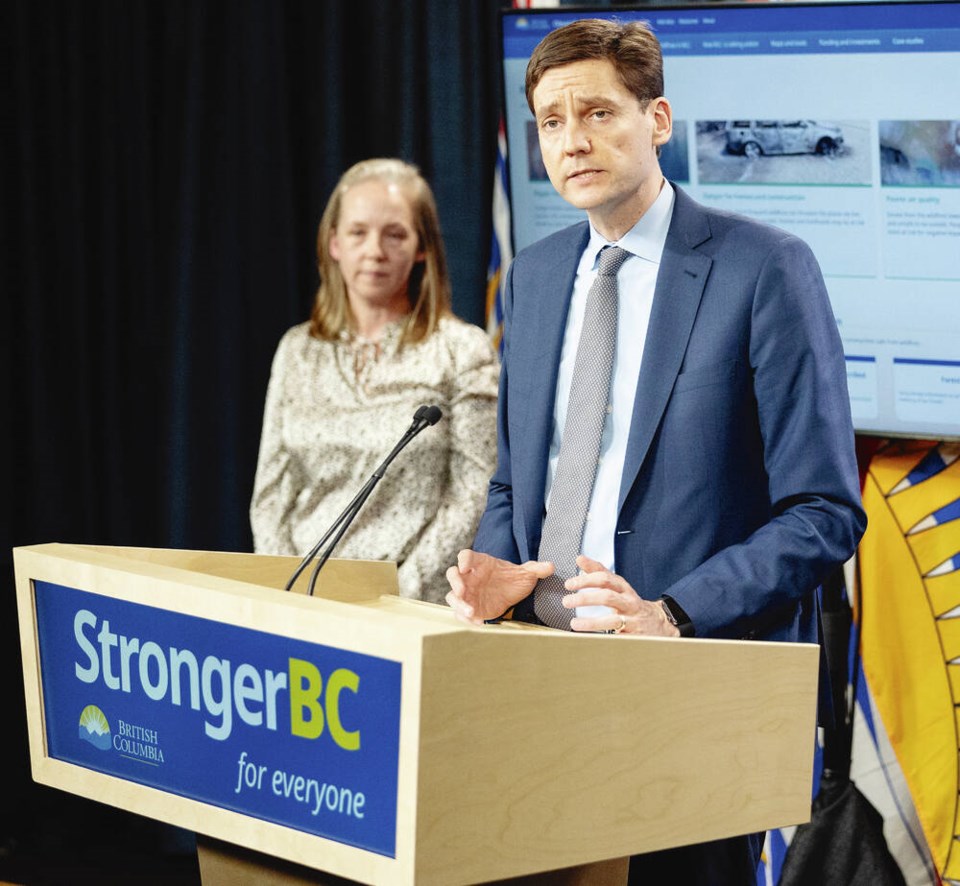Premier David Eby declined on Tuesday to comment on media reports that a $1-billion package focused on addictions treatment went before Treasury Board last week, but said his government and the B.C. Liberals are “on side” when it comes to the goal of getting people into treatment.
Details of the government’s mental health and addictions plan will be in the budget on Feb. 28, Eby said.
This month, B.C. Liberal Leader Kevin Falcon announced a proposal for a $1.5-billion recovery-oriented plan, with a no-cost system for anyone seeking help, including $995 million in treatment and recovery options.
“I was happily surprised to see the B.C. Liberals come out with their proposal to build a strong public health-care system around mental health and addiction — I think that’s great news,” Eby said at a news conference Tuesday. “I don’t believe that addiction, mental-health struggles that people are having should be a partisan issue and I was very glad to see the B.C. Liberals come on side and to shift their position that way.”
The $1-billion plan, as reported by Business in Vancouver columnist Rob Shaw, would boost detox and treatment beds for substance use and eliminate user fees on beds — a key plank of Falcon’s proposal.
B.C.’s addictions treatment system is a mix of non-profit facilities that don’t charge a fee, and ones that do charge a fee.
In 2017, in response to the drug-overdose crisis, Edgewood, with a treatment centre in Nanaimo and others across Canada, offered free treatment to one person addicted to opioids each month over one year. The Vancouver Sun said those seeking treatment for opioid addiction typically stayed in the facility for 65 to 75 days, usually at a cost of $425 per day. The total package was estimated to cost $500,000.
The province has long been criticized for not establishing a central registry or wait list for treatment beds, or measurements of success for the beds.
The provincial government is also reported to be looking to expand the model of treatment used at the Red Fish Healing Centre in Coquitlam to other parts of the province — another proposal also made by Falcon.
The 105-bed facility serves people with severe dual substance-use and mental-health issues, allowing them to stay up to nine months.
The Liberal plan called for the tripling of beds, and adding four complex-care regional facilities, including one on Vancouver Island, for about 2,200 British Columbians needing specialized mental-health treatment closer to home.
Asked how the province will staff any new positions in treatment and detox amid a Canada-wide shortage of doctors, nurses and other health-care workers, Eby said only that it is vital to have skilled workers in place.
The B.C. Coroners Service said 2,272 people died from toxic-drug poisonings in 2022, slightly fewer than the record-breaking 2,306 deaths in 2021.
Greater Victoria, Nanaimo, Vancouver, Kamloops, Kelowna, and Prince George all recorded more illicit drug-related deaths in 2022 than in any previous year.
The crisis was declared a public health emergency in 2016.
While the NDP say deep cuts to mental-health and addictions service by past B.C. Liberal governments helped contribute to the current crisis, critics point out that the death toll has increased during the party’s six years of government.
Falcon has suggested the NDP has focused too much on harm-reduction methods such as safe supply and decriminalization at the cost of helping people seek addiction treatment.
He promised a “surge” approach for treatment — as used in the health-care system — where the province pays for beds in private facilities if there is a wait list, so no one ready for treatment is forced to wait.
Eby said the province is open to any intervention that keeps people alive.
“It doesn’t matter to me whether it’s overdose-prevention sites, safe supply,” he said. “The goal is always to get people into treatment, to get them the opportunity to restart their lives — that we have alignment on that with the B.C. Liberals across the aisle is very good news.”
>>> To comment on this article, write a letter to the editor: [email protected]

.jpg;w=120;h=80;mode=crop)


